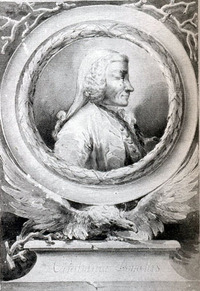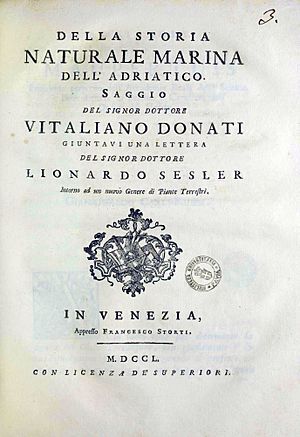Vitaliano Donati facts for kids
Vitaliano Donati (born September 8, 1717 – died February 26, 1762) was an important Italian scientist. He was born in Padua, Italy. Donati was a doctor, an archeologist, and a botanist. He earned his Doctor of Philosophy degree in 1739.
Donati was very interested in the plants (known as flora) and animals (known as fauna) living in the Adriatic Sea. In 1745, he published a famous book called Della storia naturale marina dell'Adriatico. This book was so important that it was translated into many languages across Europe.
Contents
Vitaliano Donati's Career and Discoveries
In 1750, King Charles Emmanuel III of Sardinia invited Donati to teach at the University of Turin. Donati became a professor of Botany (the study of plants) and Natural history (the study of nature). During his time as a professor, he also taught Mineralogy (the study of minerals) and Geology (the study of Earth's rocks and soil). He led the Orto Botanico dell'Università di Torino (the university's botanical garden) from 1750 until he passed away.
Donati's Global Recognition
Vitaliano Donati's work was recognized internationally. In 1757, he became a foreign member of the Royal Swedish Academy of Sciences. He also became a Fellow of the Royal Society, which is a very old and respected scientific group in London.
Donati's Explorations and Final Journey
In 1759, Donati traveled to many places, including Egypt, Syria, Palestine, and Arabia. Sadly, he died on February 26, 1762. He was traveling on a Turkish ship in the Indian Ocean, on his way to Mangalore in India.
To honor his contributions, a street in the Italian city of Torino is named after Vitaliano Donati.
Major Works by Vitaliano Donati
Here are some of the important books and works by Vitaliano Donati:
- Della storia naturale marina dell'Adriatico, (1745) – This book is about the natural history of the Adriatic Sea.
- Viaggio mineralogico nella Alpi occidentali di Vitaliano Donati – This work describes Donati's mineralogy journey in the western Alps. It was put together by Giuse Scalva and published by Editrice Compositori for the National Institute for Mountain Research in Rome (INRM).
See also
- Lectionary 300
 | Jackie Robinson |
 | Jack Johnson |
 | Althea Gibson |
 | Arthur Ashe |
 | Muhammad Ali |



